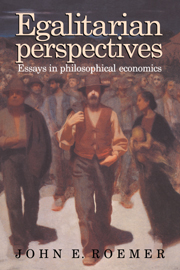Book contents
- Frontmatter
- Contents
- Acknowledgments
- List of sources
- Introduction
- Part I Exploitation
- Introduction to Part I
- 1 Exploitation, alternatives and socialism
- 2 Property relations vs. surplus value in Marxian exploitation
- 3 Should Marxists be interested in exploitation?
- 4 What is exploitation? Reply to Jeffrey Reiman
- 5 Second thoughts on property relations and exploitation
- Part II Equality of resources
- Part III Bargaining theory and justice
- Part IV Public ownership and socialism
- References
- Index
5 - Second thoughts on property relations and exploitation
Published online by Cambridge University Press: 23 December 2009
- Frontmatter
- Contents
- Acknowledgments
- List of sources
- Introduction
- Part I Exploitation
- Introduction to Part I
- 1 Exploitation, alternatives and socialism
- 2 Property relations vs. surplus value in Marxian exploitation
- 3 Should Marxists be interested in exploitation?
- 4 What is exploitation? Reply to Jeffrey Reiman
- 5 Second thoughts on property relations and exploitation
- Part II Equality of resources
- Part III Bargaining theory and justice
- Part IV Public ownership and socialism
- References
- Index
Summary
Since my book A General Theory of Exploitation and Class (GTEC) was published in 1982, a number of good criticisms have been raised against the property-relations definition of capitalist exploitation that I put forth. In light of these remarks, I would like to amend my definition.
The definition of capitalist exploitation that I put forth was as follows. Let a society be divided into a coalition S and its complement S′. S is exploited and S′ is exploiting if: (1) S would be better off if it withdrew with its per capita share of productive, alienable assets; (2) S′ would be worse off if it withdrew with its per capita share of productive, alienable assets; and (3) S′ would be worse off if S withdrew from society with its own assets. Call this the property-relations (PR) definition of exploitation. I favored the PR definition over the traditional approach, which focuses upon the relationship between capitalist and worker mediated by a labor market and consummated at the point of production, because the classical approach fails to locate the source of exploitation in the unequal and unfair distribution of the productive assets.
The criticisms that I will discuss take me to task chiefly on two points: that the PR definition fails to capture the relation of dominance or dependence between exploiter and exploited, and that it does not mention labor.
Information
- Type
- Chapter
- Information
- Egalitarian PerspectivesEssays in Philosophical Economics, pp. 104 - 112Publisher: Cambridge University PressPrint publication year: 1994
